No Bad Days: Teen Excels in Sports, Life
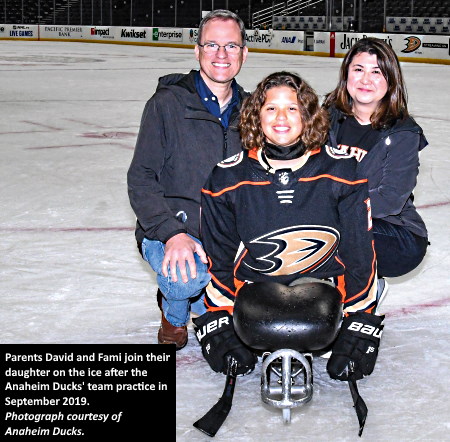 Lera Doederlein was born in Russia in April 2003 with arthrogryposis multiplex congenita, a condition of multiple joint fractures that affected her hips and lower legs. She was placed in an orphanage almost immediately.
Lera Doederlein was born in Russia in April 2003 with arthrogryposis multiplex congenita, a condition of multiple joint fractures that affected her hips and lower legs. She was placed in an orphanage almost immediately.
David and Fami Doederlein were living in Minnesota and had three biological children between six and ten years old. They went to church with families who had adopted children from foreign countries. Though the idea of an international adoption appealed to Fami from the beginning, David was hesitant. "He felt our family was right just the way it was," Fami says. "And the risks of adoption outweighed any potential benefits."
Eventually David became open to the idea of adoption. In August 2004, an agency sent the Doederleins a video of children with special needs in an orphanage in a small town in Russia. The baby girl in the video was bright-eyed and alert but had noticeable deformities in her legs, which were covered by her pajamas, Fami says.
"She was given a toy, and when it was taken away, she looked at the toy and the caregiver and watched with focus as it was taken away," David says.
There was something in the baby's eyes that spoke to David and Fami.
"When we saw Lera on this video we both decided immediately that she would be part of our family forever," David says.
Worse Than Expected
The family started the adoption process and Fami made her first trip to Russia to meet Lera in December 2004. Lera's legs were more damaged than the family initially believed. That did not stop the Doederleins. "We were even more determined to bring her home," Fami says.
David and Fami went to Russia in February 2005, completed the adoption process, and brought Lera back to the United States that month.
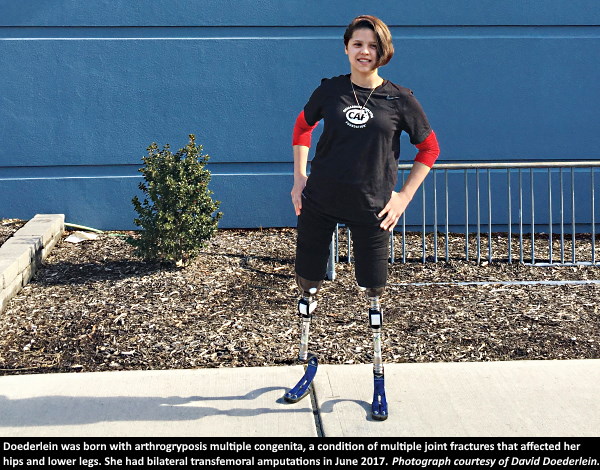
From KAFOs to Amputation
As Lera grew, she used crutches and KAFOs to help her walk. The KAFOs, however, needed constant attention due to the stress Lera placed on the devices because of her activity level, her mother says. In addition, recasting and fabrication of new custom braces were needed every year or two as Lera grew.
During a routine exam at Shriners Hospitals for Children – Los Angeles in June 2016, the family's orthopedic surgeon advised them that bilateral transfemoral amputations could be a viable option for Lera for two reasons: the surgeon's success at performing the procedure; and as Lera continued to mature, the lack of muscle tone in her legs would make it nearly impossible for her to support her weight. She would eventually be confined to a wheelchair.
"Mom and I were open to the idea immediately," Lera says. "Dad was not. He was concerned that while I struggled with my mobility with the KAFOs, my ability to walk after surgery would be completely taken away due to having only one functional hamstring in each leg."
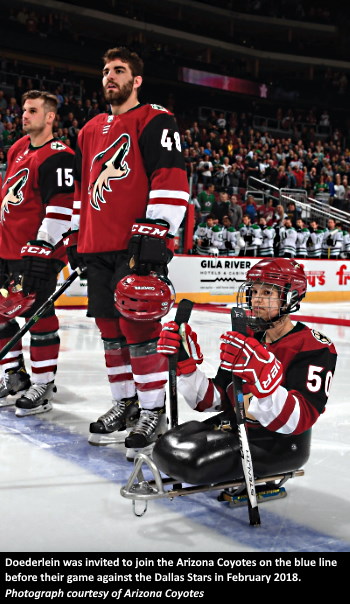 David says it was important for him to get a second opinion before he could make his decision, but the second surgeon's opinion didn't help matters.
David says it was important for him to get a second opinion before he could make his decision, but the second surgeon's opinion didn't help matters.
"He concurred with Dad's opinion," Lera says.
At Fami's encouragement, the family had another consultation with the initial orthopedic surgeon at Shriners, as well as a consultation with Jillian Okimoto, CPO, with Hanger Clinic in Phoenix. Okimoto focuses primarily on lower-limb and pediatric prosthetics. "At 14 years old I was impressed with how determined Lera was to move forward with an elective amputation," she says.
During the consultation, Okimoto says she had major concerns about range of motion problems and muscle strength in Lera's hips after the surgery, and asked the family to consult with a physical therapist. "This was a great example of a team approach used to evaluate a patient," Okimoto says. "The surgeon, therapist, and I discussed the potential outcomes and challenges that could be ahead for Lera."
The medical team was honest with Lera about their concerns and potential complications, Okimoto says. "But [Lera] was determined to become more mobile," she says. "At the end of the day, [Lera] was the one who convinced her family and medical team this was the right decision for her."
David and Fami concurred. "It was a priority of Lera's to make sure we spoke with all her team of providers prior to surgery to ensure we all knew what to expect after surgery and what we all needed to do to ensure a positive outcome," David says.
Lera underwent bilateral transfemoral amputations on June 29, 2017, at Phoenix Children's Hospital, near where the family lived.
Stubbies to Start
Lera's rehabilitation process was initially delayed due to a blister on one of the incisions, but she was fitted with stubbies in September 2017, which allowed her to develop core strength, stretch her hips, and walk with a lower sense of gravity, Okimoto says. Lera adapted in no time. "Lera got her first set of prosthetic stubbies on a Friday afternoon, and on the following Tuesday she walked into our clinic unassisted and without a walker or crutches," Okimoto says.
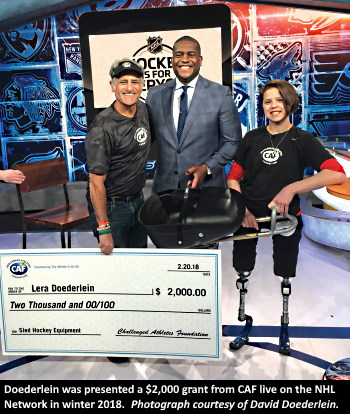 In March 2018, Lera trialed her first pair of microprocessor-controlled knees. "The computers in the knees receive feedback from multiple sensors 100 times a second, allowing the knee to anticipate movement in real time," Okimoto says. "The knees also help her to safely navigate ramps, stairs, and uneven terrain."
In March 2018, Lera trialed her first pair of microprocessor-controlled knees. "The computers in the knees receive feedback from multiple sensors 100 times a second, allowing the knee to anticipate movement in real time," Okimoto says. "The knees also help her to safely navigate ramps, stairs, and uneven terrain."
Lera says she was thrilled the first time she walked with her prostheses. "I felt so relieved that I could finally walk the way I wanted. Walking on my legs for the first time was empowering, and it began to teach me all the things I can accomplish," says Lera, now nearly 17 and a high school sophomore. Her favorite subjects are biology and world history, and she hopes to eventually go into biomedicine or O&P.
Sled Hockey Superstar
During Lera's initial fitting of her prostheses she met a prosthetist with an amputation who played sled hockey for the Phoenix Coyotes. He suggested that Lera give the sport a try, and arranged for her to practice with the team that October.
"She got on the ice for the first time in a bucket that was too large for her, but she loved the experience," David says.
Lera continued to practice with the Phoenix Coyotes and eventually joined the team later that month. In March 2018, David accepted a job in San Diego and the family moved. Lera now plays for the San Diego Ducks, and one of her biggest accomplishments is being selected for the USA Women's National Development Team.
While Lera has tried multiple sports in the last few years, including hand cycling, sitting volleyball, adaptive surfing, wheelchair lacrosse, and tennis, sled hockey remains her favorite. "I was able to adapt quickly to sled hockey because I saw the potential in myself as soon as I began," she says.
Several months after starting the sport, Lera and her parents applied for a $2,000 grant from the Challenged Athletes Foundation (CAF) for a custom sled and hockey equipment. She was presented the grant from CAF live on the NHL Network in winter 2018.
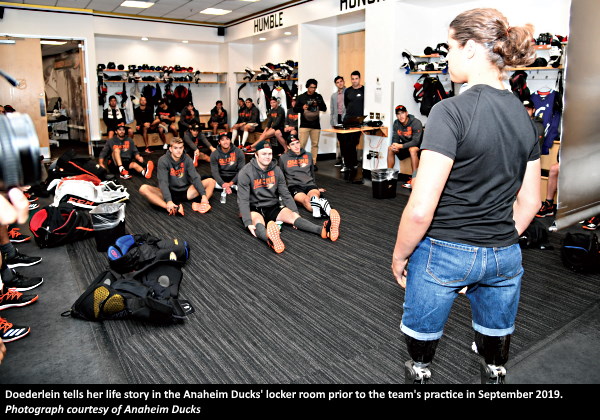
"That day was almost a complete surprise," Lera says. "While I knew we had signed up for the grant, I never knew I'd actually get it, let alone receive it on the NHL Network only several months after I started the sport."
Lera says it was surreal to discover how welcoming and supportive the NHL and sled hockey communities are in making others with goals and dreams like hers become a reality. "It made me so ecstatic and motivated for my future in the sport," she says.
Her father says it is sports that feed Lera's drive to succeed in all areas of her life. "Her motto has always been ‘no bad days,' and this is the approach she has taken to adaptive sports," he says. "It has helped her to be able to compete with other adaptive athletes because they are all on a level playing field with their disabilities and most are tough mentally, just like Lera."
Okimoto says she has been able to watch Lera—who she describes as smart, driven, self-motivated, and not easily discouraged—mature over the last few years.
"She started out so quiet and reserved, but has grown into herself," Okimoto says. "She has a lot of self-discipline, which is shown in her prosthetic progress and in sports. Lera not only returned to her prior lifestyle, but she has surpassed anything I could have imagined."
Betta Ferrendelli can be contacted at betta@opedge.com.
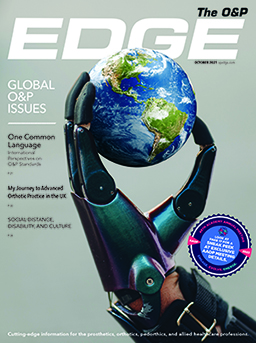





-
-
-
-
CONTACT US